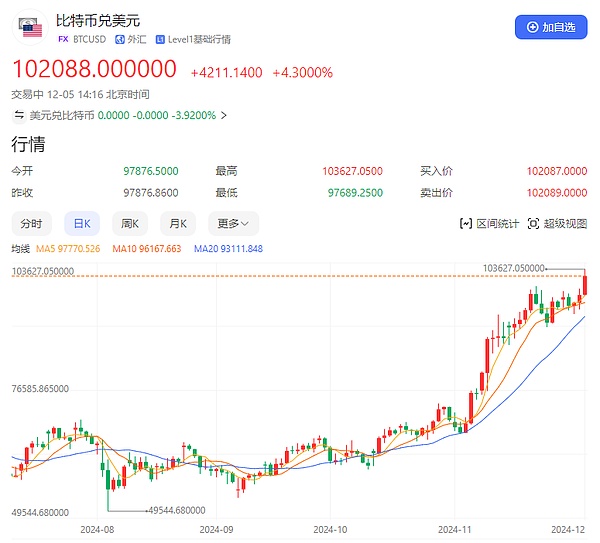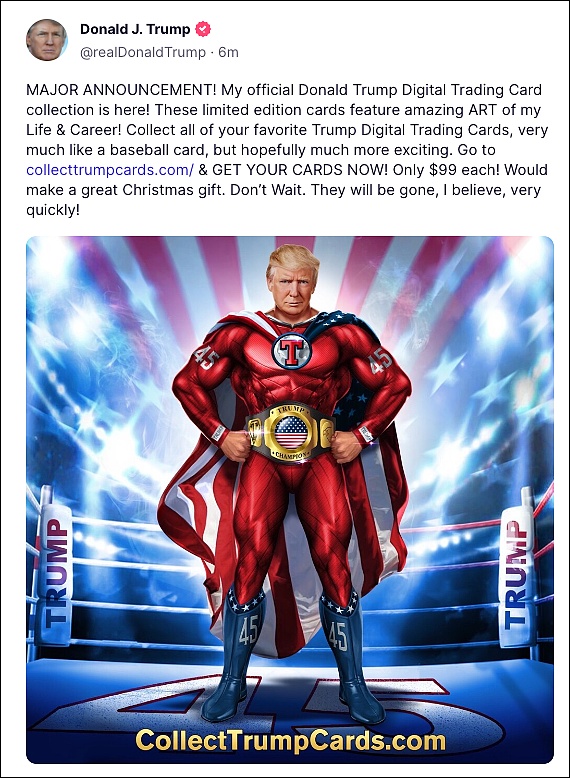Do you know about Bitcoin?
Yes, that's the mystical "virtual currency". It has no physical form, it's entirely virtual. It has been the protagonist in various "overnight wealth" stories. But because it's too "trendy", it was also once considered a hoax.
Recently, its price has been rising steadily. Especially this year, after Trump's election victory, its price has surged, with an increase of nearly 40%. Until December 5th, the price of a single Bitcoin first exceeded $100,000.

(Image from the internet)
$100,000 is not a small amount. Converted to Chinese Yuan, it's over 700,000. So, this event has also attracted a lot of attention. My circle of friends has also had many discussions about it.
Some say it's nonsense. Is it that I can issue my own "Lili Coin" tomorrow and it'll also be worth $100,000 each? This is a scam. Others say, whether it's real or not, now that it's $100,000 per coin, will it continue to rise in the future? I also want to jump in.
I'm not a professional financial practitioner, I'm not proficient in the logic of virtual currency investment.
However, I did once own a Bitcoin.
Yes, I used to own one. Looking at it this way, it seems I've lost 700,000. But is it really like that?
I'll also share this story with you.
That was about ten years ago, when I was serving as a strategic consultant for a well-known investment institution.
This investment institution was called Morningside Capital at the time, and later changed its name to Five Sources Capital. They were once angel investors in Xiaomi, and after Xiaomi went public, their investment return reached 866 times. Later, they also invested in well-known companies like Kuaishou, and they are one of the very successful investment institutions.
Every month, we would spend about two days looking at some projects to confirm whether to invest. Since I had previously worked in a technology company like Microsoft, I was more focused on technology projects.
At that time, the Internet era was experiencing explosive development, and various innovative plans and ideas were emerging one after another. I thought I was quite familiar with the technology field. But I soon found that I couldn't understand some of the entrepreneurs' plans.
Especially when I saw a virtual currency trading platform project.
That was my first encounter with virtual currency trading. I found it interesting and was very curious, so I listened to the project initiator's introduction while opening their trading website to see what it was all about.
As I was looking, I found that they supported Bitcoin trading. So, I decided to try buying one. After all, how can I raise valuable questions without actually experiencing it?
At that time, the price of Bitcoin was around 4,000 yuan per coin. I quickly completed the transaction. Afterwards, I did some more research and found that there were similar virtual currency trading platforms in the United States, such as Coinbase. So, I registered a Coinbase account and transferred the Bitcoin I had purchased on the Chinese platform to the Coinbase account, just like sending an email.
Then I discovered something that really shocked me: the Bitcoin purchased with Chinese Yuan could be immediately converted into US dollars.
Under the restrictions of foreign exchange controls, converting Chinese Yuan to US dollars is a very troublesome process. But now, I could complete this operation instantly.
Incredible. I suddenly felt that this virtual digital currency might change an era.
However, I bought this Bitcoin at the time just to better understand the project. And I didn't have the intention to invest in it. So, I didn't buy a large amount of Bitcoin.
But the surprise caused by Bitcoin has always remained in my heart. So, I have been following the policies related to Bitcoin.
In 2013, the People's Bank of China and five other departments issued a notice on preventing Bitcoin risks, stating that Bitcoin is a virtual commodity and cannot and should not be used as currency in circulation. But Bitcoin transactions are an online commodity trading behavior, and ordinary citizens have the freedom to participate at their own risk.
In 2017, CCTV reported that the central bank announced the formal rectification of Bitcoin platforms. Because Bitcoin may be used as an intermediate link for value transfer, bypassing the annual foreign exchange quota for individuals.
Later, there were continuous notices and announcements: prohibiting illegal financing, prohibiting token issuance, and strengthening supervision. The intensity has been increasing.
So, many companies that initially announced support for Bitcoin payments have temporarily suspended payments. And later, buying Bitcoin also became increasingly difficult.
So, if the payment function is cancelled, will Bitcoin completely lose its usefulness?
I didn't think too much about it. And my Bitcoin was not sold. It just lay quietly in the account until I almost forgot about it.
Until later, when I happened to remember it, I found that the Bitcoin I had originally bought for 4,000 yuan had already risen to over 50,000. It had increased more than tenfold.
So, I sold it. Because at the time, I felt the price was already very high. After all, there was once a hero who exchanged 10,000 Bitcoins for two large pizzas.

(The programmer brother Laszlo Hanyecz who spent 10,000 Bitcoins on pizzas)
And that's how I said goodbye to this Bitcoin.
But over the years, whenever I discuss the transformation of Internet finance with clients from banks, insurance companies, and fund companies, we almost always have to talk about Bitcoin. Because everyone is really amazed: why can Bitcoin have such value today?
I think it's probably because of consensus.
It's the same as "why is gold valuable". Because everyone has reached a consensus that it is valuable.
Gold, this precious metal from the earth, very cleverly meets the attributes of a trading intermediary.
First, its supply is limited. There is only so much gold on Earth. You can't produce it infinitely. Because if something can be produced infinitely, it's hard to maintain its status as currency; secondly, it's easy to divide. Whether you want more or less, it can be weighed out. If it's always in large blocks, it would be difficult to transfer; finally, it doesn't deteriorate easily. It won't go bad just by leaving it there.
Gold naturally has the attributes of currency. That's why there's the saying "gold and silver are not naturally currency, but currency is naturally gold and silver".
Once you understand why gold can become a currency, you'll understand why Bitcoin has the opportunity to become a currency.
First, its total supply is limited. According to the algorithm, its issuance will be halved every 4 years. The ultimate limit of Bitcoin worldwide is about 21 million; secondly, it's also easily divisible. The smallest unit of Bitcoin is 10 to the negative 8th power; finally, as a digital asset, Bitcoin of course won't deteriorate.
Yes, the three attributes are almost completely matched. And when Satoshi Nakamoto designed Bitcoin, he used gold as a reference.
And compared to other currencies, Bitcoin also has an advantage: higher credibility.
In 2008, Satoshi Nakamoto wrote a paper called "Bitcoin: A Peer-to-Peer Electronic Cash System".
Please note, there's a very prominent word: peer-to-peer. That is, P2P.
I know. Whenever P2P is mentioned, a lot of people must think of the sensational fraud activities in the past. P2P lending has also become a mess due to platform failures. But the original intention of P2P is not like this.
The original intention of P2P is "decentralization". Decentralization means no central institution.
Bitcoin is also a decentralized currency system without a central bank.
In a "centralized" monetary system, if you have 5,000 yuan deposited in the bank. This 5,000 yuan is actually just a data entry in the bank's ledger. All your operations on this 5,000 yuan need to go through the bank as an intermediary for identity authentication and modification before they can be completed. The bank is the center.
But what if the "center" itself has problems?
Decentralization.
The ledger is no longer just kept in the bank as a central location, but appears on all the recording nodes across the entire network. It's not possible for more than half of the computing nodes to have problems at the same time, right? Perhaps it's possible, but the probability is low.
This "decentralized accounting technology" also has another name.
Blockchain.
Bitcoin is a specific application of blockchain technology.
So, after the emergence of Bitcoin, even if a country wants to ban it, it cannot be achieved by storming into a headquarters building and arresting the leader of a group. Because it does not rely on a central authority.
This ensures that it is difficult for anyone to manipulate it. It has higher credibility.
However, this still does not mean that it can become a currency.
Unless someone believes it has value.
As one of the first cryptocurrencies to emerge, some people believe it has value. Later, when there was no official channel to recognize it, some people used it for payments. More and more people believe it has value. Gradually, Bitcoin began to operate and grow. Some wealthy people have started to leave Bitcoin as an inheritance to their children, and no inheritance tax needs to be paid. Later, some government officials and politicians also began to recognize the value of Bitcoin.
Just like Trump.
Recently, he has been promoting his idea: the government will hold a large amount of Bitcoin reserves, even replacing gold. He is not only a supporter of the crypto market, but also a direct beneficiary. The NFT of the digital trading card bearing Trump's name has earned his family $22 million.

(Trump announces the launch of digital trading cards)
Perhaps, as someone said, the purpose of the Trump administration's Bitcoin reserves may be to raise the price and pay off debts. Or there may be other reasons. But in any case, the price of Bitcoin has risen.
This is the power of consensus.
If one day Satoshi Nakamoto's dream comes true and Bitcoin officially becomes a currency, then the total global circulating currency divided by 21 million would be its value.
How much would that be? $200,000, $500,000, or even more? It's too much to calculate.
But does this possibility exist? Will Bitcoin eventually become the global transaction currency?
This is an open and complex question.
But I find it hard to imagine that many countries will recognize its status as a transaction currency. Because, to some extent, it disrupts the central bank's monetary system. When the macro-economy needs to be stimulated or braked, the central bank will find it much more difficult to influence the macro-economy by controlling the money supply as before.
Okay. I've finished the story about Bitcoin.
But the purpose of telling this story is not to lament that I bought too little or sold too early.
Because that doesn't make sense. If I hadn't sold at the time, I might be relieved now. Similarly, if the price drops, I might regret selling it at the time.
Perhaps the real focus is not on short-term judgment, but on whether one can persist in holding.
Especially when an asset has risen dozens of times, even if you still believe in its long-term value, can you persist in holding it?
This is a small reflection. It's also a small review and commemoration at the threshold of Bitcoin breaking through $100,000.
Over the past decade, the situation has been changing. Ten years ago, I bought a Bitcoin for 4,000 Chinese yuan and sold it when it reached 50,000 Chinese yuan. Now it has risen to $100,000. From 4,000 yuan to $100,000, this is not only a change in numbers, but also a microcosm of an era.
Perhaps, in this rapidly changing world, the most important thing is not to predict the future, but to maintain an open mindset.
Only in this way can we learn to grow in the midst of uncertainty.
What do you think?








